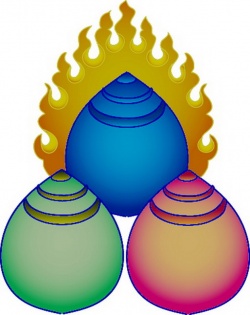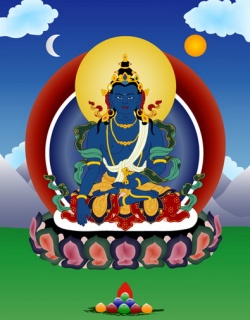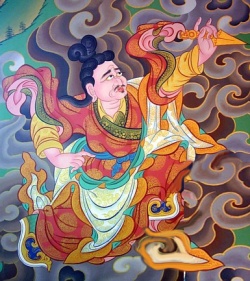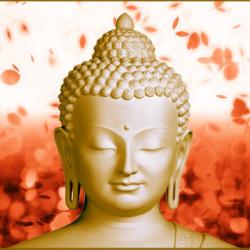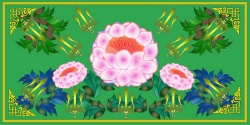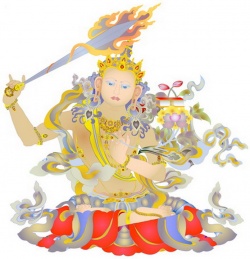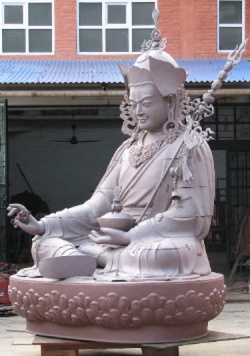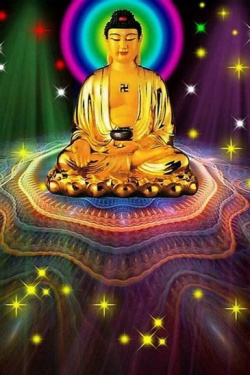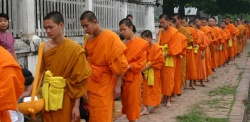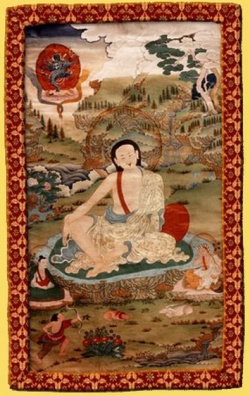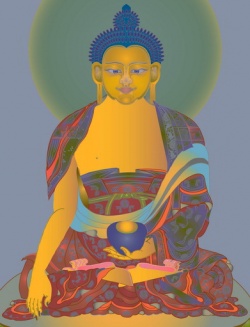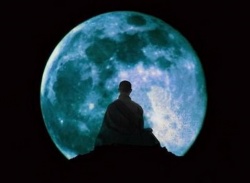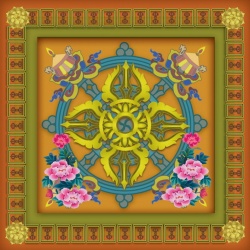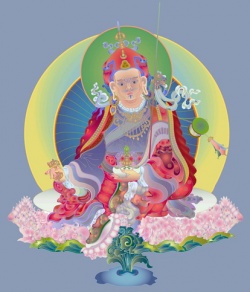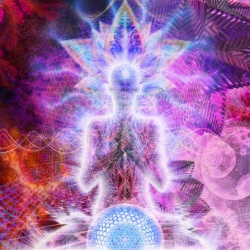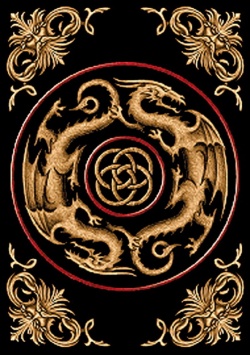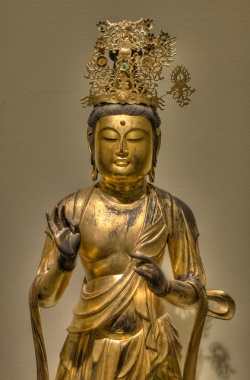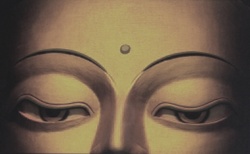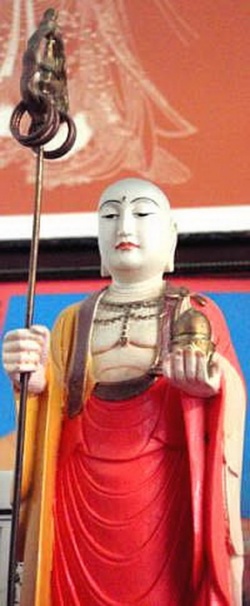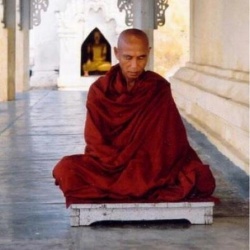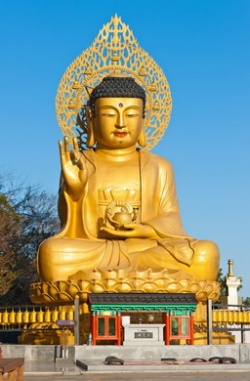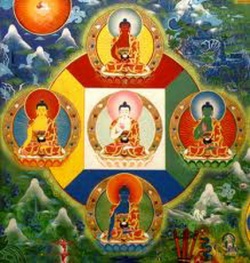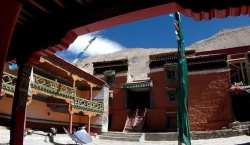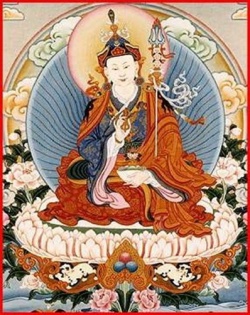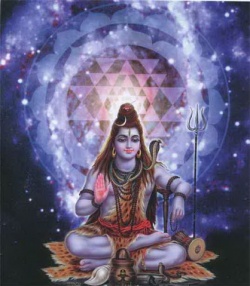Difference between revisions of "The Wonderful Dharma Lotus Flower Sutra: Chapter 4 - Belief and Understanding"
(Created page with "{{DisplayImages|2085|1928|253|3489|75|306|66|160|1162|74|3374|1303|1427|3296|906|3205|2197|394|2868|1856}} {{Centre|<big><big><big>The Dharma Lotus Flower Sutra</big></big></b...") |
m (Text replacement - "sheep" to "sheep") |
||
| (4 intermediate revisions by 2 users not shown) | |||
| Line 1: | Line 1: | ||
| − | {{DisplayImages| | + | {{DisplayImages|640|1925|3080|746|1594|730|437|3023|1342|896|2282|958|1715|63|1401|1308|1733|589|25|58|1189|1778|2629|1506|41|3|665|3258|3081|960|1384|1310}} |
{{Centre|<big><big><big>The Dharma Lotus Flower Sutra</big></big></big> <br/> | {{Centre|<big><big><big>The Dharma Lotus Flower Sutra</big></big></big> <br/> | ||
<big>Chapter 4</big><br/> | <big>Chapter 4</big><br/> | ||
<big><big>Belief and Understanding </big></big>}}<br/><br/> | <big><big>Belief and Understanding </big></big>}}<br/><br/> | ||
| − | At that time the wise and long-lived Subhuti, Mahakatyayana, Mahakashyapa, Mahamaudgalyayana, having heard from the Buddha, Dharma such as they had never heard before, the bestowal of the prediction of anuttarasamyaksambodhi upon Shariputra, felt it very rare. They rose from their seats, jumped for joy, straightened their robes, bared their right shoulders, placed their right knees on the ground, single-mindedly put their palms together, inclined themselves respectfully, gazed at the honored countenance and spoke to the Buddha, saying, “We, who dwell at the head of the Sangha and are advanced in years, told ourselves that we had already attained Nirvana and had no further responsibility, and we did not go forward to seek anuttarasamyaksambodhi.” | + | At that [[time]] the [[wise]] and long-lived [[Subhuti]], [[Mahakatyayana]], [[Mahakashyapa]], [[Mahamaudgalyayana]], having heard from the [[Buddha]], [[Dharma]] such as they had never heard before, the bestowal of the {{Wiki|prediction}} of [[anuttarasamyaksambodhi]] upon [[Shariputra]], felt it very rare. They rose from their seats, jumped for [[joy]], straightened their [[robes]], bared their right shoulders, placed their right knees on the ground, single-mindedly put their palms together, inclined themselves respectfully, gazed at the honored countenance and spoke to the [[Buddha]], saying, “We, who dwell at the head of the [[Sangha]] and are advanced in years, told ourselves that we had already attained [[Nirvana]] and had no further {{Wiki|responsibility}}, and we did not go forward to seek [[anuttarasamyaksambodhi]].” |
| − | “The World Honored One has, from of old, been speaking the Dharma for a long time. Sitting here all this time, our bodies tired, we have merely been mindful of emptiness, signlessness, and wishlessness, taking no delight in the Bodhisattva Dharmas, in their spiritual penetrations of playfulness, in their purification of Buddhalands, or in their maturation of living beings.” | + | “The [[World Honored One]] has, from of old, been {{Wiki|speaking}} the [[Dharma]] for a long [[time]]. Sitting here all this [[time]], our [[bodies]] tired, we have merely been [[mindful]] of [[emptiness]], signlessness, and wishlessness, taking no [[delight]] in the [[Bodhisattva]] [[Dharmas]], in their [[spiritual]] penetrations of playfulness, in their [[purification]] of [[Buddhalands]], or in their maturation of [[living beings]].” |
| − | “What is the reason? The World Honored One has led us to escape the Three Realms and attain certification to Nirvana. Besides, we are now advanced in years and when the Buddha taught the Bodhisattvas of anuttarasamyaksambodhi we did not give rise to even a single thought of longing for it.” | + | “What is the [[reason]]? The [[World Honored One]] has led us to escape the [[Three Realms]] and attain certification to [[Nirvana]]. Besides, we are now advanced in years and when the [[Buddha]] taught the [[Bodhisattvas]] of [[anuttarasamyaksambodhi]] we did not give rise to even a single [[thought]] of longing for it.” |
| − | “Now, in the presence of the Buddha, having heard him bestow upon the Hearers the anuttarasamyaksambodhi prediction, our hearts rejoice enthusiastically and we obtain what we never have had. We never thought that now we would suddenly be able to hear this rare Dharma. We rejoice profoundly, having gained great and good benefit.” | + | “Now, in the presence of the [[Buddha]], having heard him bestow upon the Hearers the [[anuttarasamyaksambodhi]] {{Wiki|prediction}}, our hearts rejoice enthusiastically and we obtain what we never have had. We never [[thought]] that now we would suddenly be able to hear this rare [[Dharma]]. We rejoice profoundly, having gained great and good [[benefit]].” |
| − | “It is as if, without our seeking them, limitless precious gems had come into our possession.” | + | “It is as if, without our seeking them, limitless [[precious]] [[gems]] had come into our possession.” |
| − | + | “[[World Honored One]], we would now like to speak a [[parable]] to clarify this [[principle]].” | |
| − | “It is as if there were a person who, in his youth, left his father and ran away, dwelling long in another country, perhaps ten, twenty or even fifty years.” | + | “It is as if there were a [[person]] who, in his youth, left his father and ran away, dwelling long in another country, perhaps ten, twenty or even fifty years.” |
| − | “As he grew older, he became poor and needy and ran about in the four directions in search of clothing and food. Gradually he wandered until he accidentally approached his native land.” | + | “As he grew older, he became poor and needy and ran about in the four [[directions]] in search of clothing and [[food]]. Gradually he wandered until he accidentally approached his native land.” |
| − | “His father, from the first, had set out seeking his son but in vain. He settled midway in a city. His household was one of great wealth, with limitless wealth and jewels, gold, silver, lapis lazuli, coral, amber, crystal, pearls, and other jewels. His granaries and treasuries were overflowing, and he had many servants, ministers and assistants, as well as countless elephants, horses, carriages, cattle, and sheep. The profits from his trade extended to the other countries, and there were also many traders and merchants.” | + | “His father, from the first, had set out seeking his son but in vain. He settled midway in a city. His household was one of great [[wealth]], with limitless [[wealth]] and [[jewels]], {{Wiki|gold}}, {{Wiki|silver}}, [[lapis lazuli]], coral, amber, {{Wiki|crystal}}, {{Wiki|pearls}}, and other [[jewels]]. His granaries and treasuries were overflowing, and he had many servants, ministers and assistants, as well as countless [[elephants]], [[horses]], carriages, cattle, and sheep. The profits from his trade extended to the other countries, and there were also many traders and {{Wiki|merchants}}.” |
“Then the poor son, having wandered through various villages and passed through countries and cities, at last reached the city where his father had settled.” | “Then the poor son, having wandered through various villages and passed through countries and cities, at last reached the city where his father had settled.” | ||
| − | “The father had always been mindful of his son. Although they had been separated for over fifty years, he had never spoken of the matter to anyone, but merely pondered over it, his heart filled with regret, as he thought, ‘I am old and decrepit. I have much wealth: gold, silver, and precious gems, granaries and storehouses filled to overflowing. Such a pity that I have no son! One day I’m bound to die, and when I do, my wealth will be scattered and lost, for I have no one to bequeath them to.’ This is why he ever earnestly thought of his son. ‘If I could only get my son back, I’d make him heir to my wealth. I’d be contented and happy and have no further worries.’” | + | “The father had always been [[mindful]] of his son. Although they had been separated for over fifty years, he had never spoken of the {{Wiki|matter}} to anyone, but merely pondered over it, his [[heart]] filled with [[regret]], as he [[thought]], ‘I am old and decrepit. I have much [[wealth]]: {{Wiki|gold}}, {{Wiki|silver}}, and [[precious]] [[gems]], granaries and storehouses filled to overflowing. Such a [[pity]] that I have no son! One day I’m bound to [[die]], and when I do, my [[wealth]] will be scattered and lost, for I have no one to bequeath them to.’ This is why he ever earnestly [[thought]] of his son. ‘If I could only get my son back, I’d make him heir to my [[wealth]]. I’d be contented and [[happy]] and have no further worries.’” |
| − | + | “[[World Honored One]], the poor son then, hiring himself as a laborer here and there, unexpectedly arrived at his father’s house. [[Standing]] by the gate, he saw his father seated on a Lion-seat. His feet were resting on a jeweled footstool, and he was reverently surrounded by [[Brahmans]], {{Wiki|Kshatriyas}}, and laypeople. Necklaces of {{Wiki|pearls}}, their value in the millions, adorned his [[body]]. Attendants and servants, holding white whisks, waited on him right and left. Above him was a jeweled canopy hung with [[flowers]] and pennants. Fragrant [[water]] was sprinkled on the ground, and expensive [[flowers]] were scattered about. [[Precious]] [[objects]] were placed in rows, which were passed out and taken in on leaving and entering. Such were the adornments, and the majesty and authority of his awesome [[virtue]]. When the poor son saw his father, possessed of such great power, he was immediately afraid and regretted having come there. Secretly he [[thought]], ‘This is perhaps a [[king]], or one {{Wiki|equal}} to a [[king]]. This is no place for me to hire myself out. I’d better go to a poor village where there will be room for me to work and where I can easily obtain clothing and [[food]]. If I stay here any longer, I may be forced to work.’ And with this [[thought]], he quickly ran off.” | |
| − | “Then the wealthy elder, seated on the Lion-seat, seeing his son, recognized him and his heart rejoiced greatly, as he thought, ‘I now have someone to whom I can bequeath my wealth and treasuries. I have constantly been mindful of my son, but had no way of seeing him. Then, all of a sudden, he came on his own, and my wish has been fulfilled. Although I am old and decrepit I still longed for him with regret.’” | + | “Then the wealthy elder, seated on the Lion-seat, [[seeing]] his son, [[recognized]] him and his [[heart]] rejoiced greatly, as he [[thought]], ‘I now have someone to whom I can bequeath my [[wealth]] and treasuries. I have constantly been [[mindful]] of my son, but had no way of [[seeing]] him. Then, all of a sudden, he came on his own, and my wish has been fulfilled. Although I am old and decrepit I still longed for him with [[regret]].’” |
| − | “He then sent attendants to follow him and bring him back. Thereupon, the servants quickly apprehended him. The poor son in alarm shouted in resentment, “I have committed no offense. Why have I been seized?” The servants, with even greater haste, grabbed him and dragged him back. The poor son thought to himself. ‘I am blameless and yet have been imprisoned. This surely means that I will die,’ and, even more frightened, he fainted and fell to the ground.” | + | “He then sent attendants to follow him and bring him back. Thereupon, the servants quickly apprehended him. The poor son in alarm shouted in [[resentment]], “I have committed no offense. Why have I been seized?” The servants, with even greater haste, grabbed him and dragged him back. The poor son [[thought]] to himself. ‘I am [[blameless]] and yet have been imprisoned. This surely means that I will [[die]],’ and, even more frightened, he fainted and fell to the ground.” |
| − | “The father saw his son from afar and said to the servant, “I do not need this person. Do not force him to come along. Sprinkle cold water on his face to bring him to, but do not speak further with him” Why was this? The father knew that his son’s resolve and will were inferior and lowly, and that his own nobility was a source of difficulty to his son. Therefore, although he was certain that this was his son, he expediently refrained from telling anyone, “This is my son.” The servant said to the son, “I now set you free. You may go wherever you wish.” The poor son was delighted, having gained what he had never had before. He rose from the ground and went to a poor village to seek clothing and food.” | + | “The father saw his son from afar and said to the servant, “I do not need this [[person]]. Do not force him to come along. Sprinkle cold [[water]] on his face to bring him to, but do not speak further with him” Why was this? The father knew that his son’s resolve and will were {{Wiki|inferior}} and lowly, and that his own [[nobility]] was a source of difficulty to his son. Therefore, although he was certain that this was his son, he expediently refrained from telling anyone, “This is my son.” The servant said to the son, “I now set you free. You may go wherever you wish.” The poor son was [[delighted]], having gained what he had never had before. He rose from the ground and went to a poor village to seek clothing and [[food]].” |
| − | “Then the elder, wishing to induce his son, set up an expedient and secretly sent two people, haggard and undignified in appearance, saying to them, “You may go there and gently speak to that poor one. Tell him there is a place for him to work here where he can earn twice as much. If he agrees, bring him back and put him to work. If he asks what he is to do, tell him, ‘You are being hired to sweep out dung. We two will work along with you.’” | + | “Then the elder, wishing to induce his son, set up an expedient and secretly sent two [[people]], haggard and undignified in [[appearance]], saying to them, “You may go there and gently speak to that poor one. Tell him there is a place for him to work here where he can earn twice as much. If he agrees, bring him back and put him to work. If he asks what he is to do, tell him, ‘You are being hired to sweep out dung. We two will work along with you.’” |
| − | “Then the two servants sought out the poor son, and when they found him, they told him the above matter in detail.” | + | “Then the two servants sought out the poor son, and when they found him, they told him the above {{Wiki|matter}} in detail.” |
| − | “At that time the poor son first took his salary and then joined them in sweeping away the dung. When the father saw his son, he felt pity and amazement.” | + | “At that [[time]] the poor son first took his salary and then joined them in sweeping away the dung. When the father saw his son, he felt [[pity]] and amazement.” |
“Later, on another day, through a window, he saw his son at a distance, thin, haggard, soiled with dung, dirt, and filth.” | “Later, on another day, through a window, he saw his son at a distance, thin, haggard, soiled with dung, dirt, and filth.” | ||
| − | “He then removed his necklace of beads, his soft upper garments, and his adornments and put on a coarse, worn out, and filthy robe, smeared himself with dirt and holding a dung shovel, looking frightful he addressed his workers, saying, “All of you, work hard! Do not be lax.” By this device he draws near to his son, to whom he later says, “Hey, my boy! You should stay here and work. Don’t go elsewhere. I will increase your wages. Whatever you need, be it pots, utensils, rice, flour, salt or vinegar or other such things, don’t trouble yourself about it. I also have an old, worn-out servant you can have if you need him. So put your mind at rest. I am like your father, so have no more worries. Why? I am very old, and you are young and strong. Whenever you are working, you are never deceitful, remiss, angry, hateful, or grumbling. I have never seen you commit such evils as I have other workers. From now on you shall be just like my own son.” | + | “He then removed his necklace of beads, his soft upper garments, and his adornments and put on a coarse, worn out, and filthy robe, smeared himself with dirt and holding a dung shovel, looking [[frightful]] he addressed his workers, saying, “All of you, work hard! Do not be lax.” By this device he draws near to his son, to whom he later says, “Hey, my boy! You should stay here and work. Don’t go elsewhere. I will increase your wages. Whatever you need, be it pots, utensils, {{Wiki|rice}}, flour, [[salt]] or vinegar or other such things, don’t trouble yourself about it. I also have an old, worn-out servant you can have if you need him. So put your [[mind]] at rest. I am like your father, so have no more worries. Why? I am very old, and you are young and strong. Whenever you are working, you are never deceitful, remiss, [[angry]], hateful, or grumbling. I have never seen you commit such [[evils]] as I have other workers. From now on you shall be just like my own son.” |
| − | “Just then the elder gave him a name, calling him his son. The poor son, although delighted at this happening, still referred to himself as a lowly worker from outside. For this reason, for twenty years he was constantly kept at work sweeping away dung.” | + | “Just then the elder gave him a [[name]], calling him his son. The poor son, although [[delighted]] at this happening, still referred to himself as a lowly worker from outside. For this [[reason]], for twenty years he was constantly kept at work sweeping away dung.” |
“After this, they trusted one another, and he came and went without difficulty. However, he still stayed in the same place as before.” | “After this, they trusted one another, and he came and went without difficulty. However, he still stayed in the same place as before.” | ||
| − | + | “[[World Honored One]]: At that [[time]], the elder grew sick and knew he would [[die]] before long. He said to the poor son, “I now possess much {{Wiki|gold}}, {{Wiki|silver}}, and [[jewels]], and my granaries and storehouses are filled to overflowing. You should know in detail their quantities and the amounts to be received and given. Such are my [[thoughts]], and you should understand what I mean. What is the [[reason]]? You and I are now no different. You should be even more careful that nothing be lost.” | |
| − | “At that time, the poor son, having received these instructions, took charge of all the goods, the gold, silver, and precious gems, as well as the granaries and storehouses, and yet he did not long for so much as a single meal. He continued to stay in the same place, still unable to let go of his lowly thoughts.” | + | “At that [[time]], the poor son, having received these instructions, took charge of all the goods, the {{Wiki|gold}}, {{Wiki|silver}}, and [[precious]] [[gems]], as well as the granaries and storehouses, and yet he did not long for so much as a single meal. He continued to stay in the same place, still unable to let go of his lowly [[thoughts]].” |
| − | “After a short while, the father knew that his son had grown more relaxed, that he had accomplished the great resolve and despised his former state of mind. Knowing that his own end was near, he ordered his son to gather together all the relatives, kings, great ministers, Kshatriyas, and lay people. When they had all assembled, he spoke to them saying, “All of you gentlemen should know that this is my son, begotten by me. In a certain city, he left me and ran away to suffer desolation, poverty, and hardship for over fifty years. His original name was such and such, and my name was such. Long ago, in my native city, I anxiously sought him. Suddenly, here, I have found him again! This is really my son. I am really his father. All of my wealth now belongs to my son, and all that has been paid out and taken in is known by him.” | + | “After a short while, the father knew that his son had grown more [[relaxed]], that he had accomplished the great resolve and despised his former [[state of mind]]. [[Knowing]] that his own end was near, he ordered his son to [[gather]] together all the relatives, [[kings]], great ministers, {{Wiki|Kshatriyas}}, and [[lay people]]. When they had all assembled, he spoke to them saying, “All of you gentlemen should know that this is my son, begotten by me. In a certain city, he left me and ran away to [[suffer]] desolation, {{Wiki|poverty}}, and hardship for over fifty years. His original [[name]] was such and such, and my name was such. Long ago, in my native city, I anxiously sought him. Suddenly, here, I have found him again! This is really my son. I am really his father. All of my [[wealth]] now belongs to my son, and all that has been paid out and taken in is known by him.” |
| − | + | “[[World Honored One]], when the poor son heard what his father had said, he rejoiced greatly, having obtained what he had never had, and he [[thought]], ‘Originally, I had no [[thought]] to seek anything, and now this treasury has come to me of itself.’” | |
| − | + | “[[World Honored One]], the great and wealthy elder is the [[Thus Come One]]. We are all like the [[Buddha’s]] sons.” | |
| − | “The Thus Come One always says that we are his sons.” | + | “The [[Thus Come One]] always says that we are his sons.” |
| − | + | “[[World Honored One]], because of the three kinds of [[suffering]], we have [[suffered]] much torment in the midst of [[births]] and [[deaths]]. Deluded and [[ignorant]], we clung to petty [[dharmas]].” | |
| − | “Today, the World Honored One has caused us to think about getting rid of the dung of frivolous discussions of the Dharma. We increased our vigor to earn one day’s wage of Nirvana. Having attained this, our hearts rejoiced greatly, and we were content, saying to ourselves that, through our diligence and vigor, what we had gained in the Buddhadharma was plentiful.” | + | “Today, the [[World Honored One]] has [[caused]] us to think about getting rid of the dung of frivolous discussions of the [[Dharma]]. We increased our [[vigor]] to earn one day’s wage of [[Nirvana]]. Having attained this, our hearts rejoiced greatly, and we were content, saying to ourselves that, through our [[diligence]] and [[vigor]], what we had gained in the [[Buddhadharma]] was plentiful.” |
| − | “However, the World Honored One, knowing all along that our minds were attached to lowly desires and took delight in petty dharmas, let us go our own way and did not specify to us saying, ‘You are all to have a share in the treasury of the Thus Come One’s knowledge and vision.’” | + | “However, the [[World Honored One]], [[knowing]] all along that our [[minds]] were [[attached]] to lowly [[desires]] and took [[delight]] in petty [[dharmas]], let us go our own way and did not specify to us saying, ‘You are all to have a share in the treasury of the Thus Come One’s [[knowledge and vision]].’” |
| − | “The World Honored One, using the power of expedient devices, has spoken of the Thus Come One’s wisdom. Having gained from the Buddha the one day’s wage of Nirvana, we took it to be a great attainment; we had no ambition to seek the Great Vehicle. Besides, the wisdom of the Thus Come One had been set forth for the sake of the Bodhisattvas, and so we held no expectations regarding it. What is the reason? The Buddha knew that our minds took delight in petty dharmas. He used the power of expedients to teach us in the appropriate manner, and we did not know that we were truly the Buddha’s sons.” | + | “The [[World Honored One]], using the power of expedient devices, has spoken of the Thus Come One’s [[wisdom]]. Having gained from the [[Buddha]] the one day’s wage of [[Nirvana]], we took it to be a great [[attainment]]; we had no [[ambition]] to seek the [[Great Vehicle]]. Besides, the [[wisdom]] of the [[Thus Come One]] had been set forth for the sake of the [[Bodhisattvas]], and so we held no expectations regarding it. What is the [[reason]]? The [[Buddha]] knew that our [[minds]] took [[delight]] in petty [[dharmas]]. He used the power of expedients to teach us in the appropriate [[manner]], and we did not know that we were truly the [[Buddha’s]] sons.” |
| − | “Now we know that the World Honored One is by no means ungenerous with the Buddha’s wisdom. Why? From of old, we truly have been the Buddha’s sons, and yet we delighted only in petty dharmas. If we had thought to delight in the great, the Buddha would then have spoken for us the Great Vehicle Dharma. This Sutra speaks of only One Vehicle. In the past, in the presence of the Bodhisattvas, the Buddha had belittled the Hearers who delight in lesser dharmas, but he was actually employing the Great Vehicle in teaching and transforming them.” | + | “Now we know that the [[World Honored One]] is by no means ungenerous with the [[Buddha’s wisdom]]. Why? From of old, we truly have been the [[Buddha’s]] sons, and yet we [[delighted]] only in petty [[dharmas]]. If we had [[thought]] to [[delight]] in the great, the [[Buddha]] would then have spoken for us the [[Great Vehicle]] [[Dharma]]. This [[Sutra]] speaks of only One [[Vehicle]]. In the {{Wiki|past}}, in the presence of the [[Bodhisattvas]], the [[Buddha]] had belittled the Hearers who [[delight]] in lesser [[dharmas]], but he was actually employing the [[Great Vehicle]] in [[teaching]] and [[transforming]] them.” |
| − | “Therefore, we say that originally we had not hoped for or sought anything, and yet now these great jewels of the Dharma King have come to us of themselves. That which the Buddha’s sons should attain, we have already attained.” | + | “Therefore, we say that originally we had not hoped for or sought anything, and yet now these great [[jewels]] of the [[Dharma King]] have come to us of themselves. That which the [[Buddha’s]] sons should attain, we have already attained.” |
<poem> | <poem> | ||
| − | At that time, Mahakashyapa, wishing to restate this meaning, spoke verses, saying, | + | At that [[time]], [[Mahakashyapa]], wishing to restate this meaning, spoke verses, saying, |
“We, on this day, | “We, on this day, | ||
| − | Hearing the sound of the Buddha’s teaching, | + | Hearing the [[sound]] of the [[Buddha’s teaching]], |
| − | Jump for joy! | + | Jump for [[joy]]! |
Gaining what we never had. | Gaining what we never had. | ||
| − | The Buddha says that Hearers, | + | The [[Buddha]] says that Hearers, |
| − | Shall become Buddhas in the future. | + | Shall become [[Buddhas]] in the {{Wiki|future}}. |
| − | A cluster of supreme gems, | + | A cluster of supreme [[gems]], |
We have gained, without our seeking. | We have gained, without our seeking. | ||
It is like a youth, | It is like a youth, | ||
| − | Who, young and ignorant, | + | Who, young and [[ignorant]], |
Ran away from his father | Ran away from his father | ||
To another distant land, | To another distant land, | ||
| Line 92: | Line 92: | ||
His father, worried about him, | His father, worried about him, | ||
| − | Sought him in the four directions | + | Sought him in the four [[directions]] |
Until, tired of the search, | Until, tired of the search, | ||
He stopped in a certain city, | He stopped in a certain city, | ||
Where he built himself a house | Where he built himself a house | ||
| − | And amused himself with the five desires. | + | And amused himself with the [[five desires]]. |
His household was large and wealthy, | His household was large and wealthy, | ||
| − | With much gold and silver, | + | With much {{Wiki|gold}} and {{Wiki|silver}}, |
| − | Mother-of-pearl, carnelian, | + | Mother-of-pearl, {{Wiki|carnelian}}, |
| − | Real pearls, and lapis lazuli, | + | Real {{Wiki|pearls}}, and [[lapis lazuli]], |
| − | Elephants, horses, cattle, and sheep, | + | [[Elephants]], [[horses]], cattle, and sheep, |
Hand-drawn carts, palanquins, and chariots, | Hand-drawn carts, palanquins, and chariots, | ||
Husbandmen and servants, | Husbandmen and servants, | ||
| − | And a multitude of subjects. | + | And a multitude of [[subjects]]. |
The profits from his trade | The profits from his trade | ||
Extended to the other countries. | Extended to the other countries. | ||
| − | Traders and merchants | + | Traders and {{Wiki|merchants}} |
| − | Were present everywhere. | + | Were {{Wiki|present}} everywhere. |
Multitudes in the hundreds of millions | Multitudes in the hundreds of millions | ||
Surrounded him reverently. | Surrounded him reverently. | ||
| − | And always, by kings, | + | And always, by [[kings]], |
He was cherished and remembered. | He was cherished and remembered. | ||
| − | The ministers and noble clans | + | The ministers and [[noble]] {{Wiki|clans}} |
All honored him. | All honored him. | ||
| − | For those reasons, | + | For those [[reasons]], |
Those who came and went were many. | Those who came and went were many. | ||
| − | Such was his nobility, wealth, | + | Such was his [[nobility]], [[wealth]], |
And his great authority. | And his great authority. | ||
But then, as he grew old and decrepit, | But then, as he grew old and decrepit, | ||
| − | He was filled with worry for his son. | + | He was filled with {{Wiki|worry}} for his son. |
| − | Morning and evening, his only thought was, | + | Morning and evening, his only [[thought]] was, |
| − | “My time of death is drawing near. | + | “My [[time]] of [[death]] is drawing near. |
| − | My foolish son has left me now, | + | My [[foolish]] son has left me now, |
For over fifty years. | For over fifty years. | ||
The things in my granaries and store-houses, | The things in my granaries and store-houses, | ||
| Line 130: | Line 130: | ||
Then the poor son, | Then the poor son, | ||
| − | Seeking clothing and food, | + | Seeking clothing and [[food]], |
Went from city to city, | Went from city to city, | ||
From country to country, | From country to country, | ||
| Line 142: | Line 142: | ||
Hiring himself out along the way, | Hiring himself out along the way, | ||
He finally reached his father’s house. | He finally reached his father’s house. | ||
| − | At that time, the elder, | + | At that [[time]], the elder, |
Within his gateway, | Within his gateway, | ||
Was covered by a large canopy, | Was covered by a large canopy, | ||
| Line 149: | Line 149: | ||
And various attendants. | And various attendants. | ||
Some of them were counting up | Some of them were counting up | ||
| − | His gold, silver, and other valuables. | + | His {{Wiki|gold}}, {{Wiki|silver}}, and other valuables. |
His income and expenses were | His income and expenses were | ||
Recorded there on ledgers. | Recorded there on ledgers. | ||
When the poor son saw his father, | When the poor son saw his father, | ||
| − | Of such nobility and wealth, | + | Of such [[nobility]] and [[wealth]], |
| − | He said, “This must be a king, | + | He said, “This must be a [[king]], |
| − | Or the equal of a king.” | + | Or the {{Wiki|equal}} of a [[king]].” |
In fright, he reproved himself, | In fright, he reproved himself, | ||
“Why have I come here?” | “Why have I come here?” | ||
| Line 162: | Line 162: | ||
I may be oppressed | I may be oppressed | ||
And forced to go to work.” | And forced to go to work.” | ||
| − | Having had this thought, | + | Having had this [[thought]], |
He hurriedly ran off | He hurriedly ran off | ||
To a poor village, asking | To a poor village, asking | ||
| Line 168: | Line 168: | ||
Just then, the elder, | Just then, the elder, | ||
| − | Seated on the lion-throne, | + | Seated on the [[lion-throne]], |
Saw his son at a distance, | Saw his son at a distance, | ||
| − | And silently recognized him. | + | And silently [[recognized]] him. |
He then commanded his attendants | He then commanded his attendants | ||
| Line 176: | Line 176: | ||
The poor son cried out in alarm, | The poor son cried out in alarm, | ||
And fainted, falling to the ground. | And fainted, falling to the ground. | ||
| − | “These people have caught me! | + | “These [[people]] have caught me! |
I shall certainly be killed! | I shall certainly be killed! | ||
| − | Why, for food and clothing’s sake | + | Why, for [[food]] and clothing’s sake |
Did I come to this place?” | Did I come to this place?” | ||
The elder knew that his son | The elder knew that his son | ||
| − | Was foolish and lowly. | + | Was [[foolish]] and lowly. |
“He wouldn’t believe me if I told him | “He wouldn’t believe me if I told him | ||
He wouldn’t believe that I am his father. | He wouldn’t believe that I am his father. | ||
| Line 188: | Line 188: | ||
And sent some other men, | And sent some other men, | ||
One-eyed, squat, and ugly, | One-eyed, squat, and ugly, | ||
| − | Lacking awesome virtue. | + | Lacking awesome [[virtue]]. |
“Speak to him,” he said, | “Speak to him,” he said, | ||
“And tell him, ‘You will work with us | “And tell him, ‘You will work with us | ||
| Line 196: | Line 196: | ||
He happily followed them back | He happily followed them back | ||
And swept out the dung and filth, | And swept out the dung and filth, | ||
| − | Cleaning all the dwellings. | + | Cleaning all the {{Wiki|dwellings}}. |
From his window, the elder | From his window, the elder | ||
Would often watch his son, | Would often watch his son, | ||
| − | Remembering that he was foolish and lowly | + | Remembering that he was [[foolish]] and lowly |
And enjoyed menial work. | And enjoyed menial work. | ||
Then the elder | Then the elder | ||
| Line 207: | Line 207: | ||
Went to where his son was. | Went to where his son was. | ||
Expediently drawing near to him, | Expediently drawing near to him, | ||
| − | He said, “Work with diligence, | + | He said, “Work with [[diligence]], |
For I have increased your wages, | For I have increased your wages, | ||
And shall give you oil for your feet, | And shall give you oil for your feet, | ||
| − | And your fill of food and drink, | + | And your fill of [[food]] and drink, |
And thick, warm bedding.” | And thick, warm bedding.” | ||
Thus he spoke sharply saying, | Thus he spoke sharply saying, | ||
| Line 217: | Line 217: | ||
“You are like my own son. | “You are like my own son. | ||
| − | The elder, in his wisdom, | + | The elder, in his [[wisdom]], |
Eventually allowed him to come and go. | Eventually allowed him to come and go. | ||
For a period of twenty years, | For a period of twenty years, | ||
He was put in charge of household business. | He was put in charge of household business. | ||
| − | He showed him his gold, silver, | + | He showed him his {{Wiki|gold}}, {{Wiki|silver}}, |
| − | Real pearls and crystal. | + | Real {{Wiki|pearls}} and {{Wiki|crystal}}. |
The income and expense of all these things, | The income and expense of all these things, | ||
| − | He was caused to know. | + | He was [[caused]] to know. |
And yet the son still lived outside the gate, | And yet the son still lived outside the gate, | ||
Dwelling in a grass hut | Dwelling in a grass hut | ||
| − | Thinking of his poverty: | + | [[Thinking]] of his {{Wiki|poverty}}: |
“None of these things are mine. | “None of these things are mine. | ||
| − | The father knew his son’s mind | + | The father knew his son’s [[mind]] |
Gradually had expanded, | Gradually had expanded, | ||
| − | And wishing to give him wealth, | + | And wishing to give him [[wealth]], |
| − | He gathered together his relatives, | + | He [[gathered]] together his relatives, |
| − | The kings, and great ministers, | + | The [[kings]], and great ministers, |
| − | The Kshatriyas and lay people. | + | The {{Wiki|Kshatriyas}} and [[lay people]]. |
| − | In the midst of this great assembly , | + | In the midst of this [[great assembly]] , |
He said, “This is my son. | He said, “This is my son. | ||
He left me and went away | He left me and went away | ||
| Line 251: | Line 251: | ||
That he may use it as he pleases | That he may use it as he pleases | ||
| − | The son, recalling his former poverty | + | The son, recalling his former {{Wiki|poverty}} |
| − | And his lowly intentions. | + | And his lowly {{Wiki|intentions}}. |
Who now, in his father’s presence | Who now, in his father’s presence | ||
| − | Had obtained these precious jewels, | + | Had obtained these [[precious]] [[jewels]], |
And these dwelling places, | And these dwelling places, | ||
| − | And all such wealth, | + | And all such [[wealth]], |
Greatly rejoiced, | Greatly rejoiced, | ||
Having gained what he’d never had. | Having gained what he’d never had. | ||
| − | The Buddha in the same way | + | The [[Buddha]] in the same way |
Knew our fondness for the petty. | Knew our fondness for the petty. | ||
And so he never said to us, | And so he never said to us, | ||
| − | “You shall become Buddhas.” | + | “You shall become [[Buddhas]].” |
Instead he said that we | Instead he said that we | ||
| − | Could attain cessation of all outflows, | + | Could attain [[cessation]] of all outflows, |
| − | Realize the lesser vehicle, | + | Realize the [[lesser vehicle]], |
| − | And become Hearer Disciples. | + | And become Hearer [[Disciples]]. |
| − | The Buddha has instructed us | + | The [[Buddha]] has instructed us |
| − | To speak of the unsurpassed Path, | + | To speak of the [[unsurpassed]] [[Path]], |
And spoken of those who practice it | And spoken of those who practice it | ||
| − | As being able to accomplish Buddhahood. | + | As being able to accomplish [[Buddhahood]]. |
| − | Receiving the Buddha’s teaching, we | + | Receiving the [[Buddha’s teaching]], we |
| − | For the sake of the Great Bodhisattvas, | + | For the sake of the [[Great Bodhisattvas]], |
| − | Use causes and conditions, | + | Use [[causes]] and [[conditions]], |
Various analogies, | Various analogies, | ||
| − | And numerous expressions | + | And numerous {{Wiki|expressions}} |
| − | To speak of the unsurpassed Path. | + | To speak of the [[unsurpassed]] [[Path]]. |
| − | All the Buddha’s disciples, | + | All the [[Buddha’s]] [[disciples]], |
| − | Having heard from us this Dharma, | + | Having heard from us this [[Dharma]], |
Think upon it day and night, | Think upon it day and night, | ||
And diligently practice it. | And diligently practice it. | ||
| − | Thereupon, all the Buddhas, | + | Thereupon, all the [[Buddhas]], |
Then bestow predictions upon them, | Then bestow predictions upon them, | ||
| − | Saying, “You, in future age, | + | Saying, “You, in {{Wiki|future}} age, |
| − | Shall become Buddhas.” | + | Shall become [[Buddhas]].” |
| − | This is the secret store of Dharma, | + | This is the secret store of [[Dharma]], |
| − | Of all the Buddhas. | + | Of all the [[Buddhas]]. |
| − | Only for the Bodhisattvas | + | Only for the [[Bodhisattvas]] |
Are such real matters set forth. | Are such real matters set forth. | ||
And not for our sakes | And not for our sakes | ||
| − | Have such true essentials been spoken. | + | Have such true [[essentials]] been spoken. |
Just as the poor son. | Just as the poor son. | ||
Drew near his father, and | Drew near his father, and | ||
Although he knew of all his possessions, | Although he knew of all his possessions, | ||
| − | In his heart he held no hope of getting them, | + | In his [[heart]] he held no {{Wiki|hope}} of getting them, |
In just the same way, | In just the same way, | ||
Even though we have spoken | Even though we have spoken | ||
| − | Of the Buddhadharma’s precious store, | + | Of the Buddhadharma’s [[precious]] store, |
We personally never aspired to it. | We personally never aspired to it. | ||
Having attained inner-extinction, | Having attained inner-extinction, | ||
| − | We thought this sufficient, | + | We [[thought]] this sufficient, |
For having completed this, | For having completed this, | ||
There was nothing else to be done. | There was nothing else to be done. | ||
And even if we had heard | And even if we had heard | ||
| − | Of purifying Buddhalands, | + | Of purifying [[Buddhalands]], |
| − | And teaching and transforming living beings, | + | And [[teaching]] and [[transforming]] [[living beings]], |
| − | We’d have taken no delight therein. | + | We’d have taken no [[delight]] therein. |
| − | And for what reason? | + | And for what [[reason]]? |
| − | All dharmas are | + | All [[dharmas]] are |
| − | Completely empty and still, | + | Completely [[empty]] and still, |
Neither produced nor destroyed, | Neither produced nor destroyed, | ||
Neither great nor small, | Neither great nor small, | ||
| − | Without outflows and unconditioned. | + | Without outflows and [[unconditioned]]. |
Reflecting in this way, | Reflecting in this way, | ||
| − | We did not give rise to joy. | + | We did not give rise to [[joy]]. |
During the long night, | During the long night, | ||
| − | We had no craving or attachment | + | We had no [[craving]] or [[attachment]] |
| − | For the Buddha’s wisdom, | + | For the [[Buddha’s wisdom]], |
Nor did we aspire to it, | Nor did we aspire to it, | ||
| − | Yet, as to Dharma, we | + | Yet, as to [[Dharma]], we |
| − | Claimed we had the ultimate. | + | Claimed we had the [[Wikipedia:Absolute (philosophy)|ultimate]]. |
All through the long night, | All through the long night, | ||
| − | We practiced and cultivated the Dharma of emptiness. | + | We practiced and cultivated the [[Dharma]] of [[emptiness]]. |
| − | Having won release from the triple world | + | Having won release from the triple [[world]] |
| − | With its suffering, distress and calamities, | + | With its [[suffering]], {{Wiki|distress}} and {{Wiki|calamities}}, |
| − | We dwell within our final bodies, | + | We dwell within our final [[bodies]], |
| − | In nirvana with residue. | + | In [[nirvana]] with residue. |
| − | According to the Buddha’s teaching, | + | According to the [[Buddha’s teaching]], |
We attained the Way which is not false, | We attained the Way which is not false, | ||
And we assumed that we had | And we assumed that we had | ||
| − | Thereby repaid the Buddha’s kindness. | + | Thereby repaid the [[Buddha’s]] [[kindness]]. |
Although we, for the sake | Although we, for the sake | ||
| − | Of the Buddha’s disciples spoke | + | Of the [[Buddha’s]] [[disciples]] spoke |
| − | Of the Bodhisattvas Dharma, | + | Of the [[Bodhisattvas]] [[Dharma]], |
| − | With which they should seek Buddhahood, | + | With which they should seek [[Buddhahood]], |
| − | Still in this Dharma, | + | Still in this [[Dharma]], |
| − | We never took delight at all. | + | We never took [[delight]] at all. |
| − | Our master saw this and let things be, | + | Our [[master]] saw this and let things be, |
Because he saw into our hearts, | Because he saw into our hearts, | ||
And so, at first, he did not encourage us | And so, at first, he did not encourage us | ||
| Line 349: | Line 349: | ||
Just as the wealthy elder | Just as the wealthy elder | ||
Used the power of expedients | Used the power of expedients | ||
| − | To bring his mind under control, | + | To bring his [[mind]] under control, |
And afterwards gave to him | And afterwards gave to him | ||
All of his valuables, | All of his valuables, | ||
| − | The Buddha in the same way | + | The [[Buddha]] in the same way |
| − | Manifests rare things, | + | [[Manifests]] rare things, |
| − | But for those who delight in the small, | + | But for those who [[delight]] in the small, |
He uses the power of expedients | He uses the power of expedients | ||
| − | To brings their minds under control, | + | To brings their [[minds]] under control, |
| − | Only then teaching the greater wisdom | + | Only then [[teaching]] the greater [[wisdom]] |
On this day, we | On this day, we | ||
Have gained what we never had! | Have gained what we never had! | ||
| − | That for which we lacked hope, | + | That for which we lacked {{Wiki|hope}}, |
We now have attained. | We now have attained. | ||
Just as the poor son | Just as the poor son | ||
| − | Gained limitless treasure, | + | Gained limitless [[treasure]], |
| − | O World Honored One, now | + | O [[World Honored One]], now |
| − | We’ve obtained the Path and its fruits. | + | We’ve obtained the [[Path]] and its {{Wiki|fruits}}. |
| − | Within the non-outflow Dharma | + | Within the non-outflow [[Dharma]] |
| − | We’ve gained the eye, pure and clear. | + | We’ve gained the [[eye]], [[pure]] and clear. |
During the long night, we | During the long night, we | ||
| − | Maintained the Buddha’s pure morality | + | Maintained the [[Buddha’s]] [[pure]] [[morality]] |
But only on this day, | But only on this day, | ||
Have we gained this reward. | Have we gained this reward. | ||
| − | In the Dharma Kings’s Dharma, | + | In the [[Dharma]] Kings’s [[Dharma]], |
| − | Long have we cultivated Brahman conduct. | + | Long have we cultivated [[Brahman]] conduct. |
Now we’ve obtained that non-outflow, | Now we’ve obtained that non-outflow, | ||
| − | The unsurpassed, great fruition. | + | The [[unsurpassed]], great [[fruition]]. |
Now we are all | Now we are all | ||
Truly Hearers. | Truly Hearers. | ||
| − | And taking the sound of the Buddha’s Way, | + | And taking the [[sound]] of the [[Buddha’s]] Way, |
| − | We cause all to hear it. | + | We [[cause]] all to hear it. |
Now we are all | Now we are all | ||
| − | Truly Arhats, | + | Truly [[Arhats]], |
| − | And in all the world, | + | And in all the [[world]], |
| − | With its gods, people, maras and Brahmas, | + | With its [[gods]], [[people]], [[maras]] and [[Brahmas]], |
Everywhere among them | Everywhere among them | ||
| − | We are worthy of receiving offerings. | + | We are [[worthy]] of receiving [[offerings]]. |
| − | The World Honored One in his great kindness, | + | The [[World Honored One]] in his great [[kindness]], |
Uses this rare thing, | Uses this rare thing, | ||
| − | To pity, teach. | + | To [[pity]], teach. |
| − | And benefit us, | + | And [[benefit]] us, |
Throughout limitless millions of eons. | Throughout limitless millions of eons. | ||
Who could repay him? | Who could repay him? | ||
Giving one’s hands and feet, | Giving one’s hands and feet, | ||
Bowing reverently in obeisance, | Bowing reverently in obeisance, | ||
| − | Whatever offering one makes, | + | Whatever [[offering]] one makes, |
Never repays him. | Never repays him. | ||
If one bore him on one’s head, | If one bore him on one’s head, | ||
Or carried him upon one’s shoulders, | Or carried him upon one’s shoulders, | ||
| − | For aeons as numerous as the | + | For [[aeons]] as numerous as the [[Ganges]]’ sands, |
| − | Exhausting one’s mind in reverence- | + | Exhausting one’s [[mind]] in reverence- |
Or further, if one used delicacies, | Or further, if one used delicacies, | ||
And limitless valuable clothing, | And limitless valuable clothing, | ||
And all types of bedding, | And all types of bedding, | ||
| − | And various medicines, | + | And various {{Wiki|medicines}}, |
| − | Ox-head sandalwood, | + | Ox-head [[sandalwood]], |
| − | And various precious gems, | + | And various [[precious]] [[gems]], |
| − | Or stupas and temples | + | Or [[stupas]] and [[temples]] |
Covering the ground with valuable cloth, | Covering the ground with valuable cloth, | ||
And if with such things as these, | And if with such things as these, | ||
| − | One made offerings | + | One made [[offerings]] |
| − | Throughout aeons as numerous as the | + | Throughout [[aeons]] as numerous as the [[Ganges]]’ sands, |
One still never repays him. | One still never repays him. | ||
| − | The Buddhas are rare indeed. | + | The [[Buddhas]] are rare indeed. |
| − | Limitless and boundless, | + | Limitless and [[boundless]], |
| − | Yes, inconceivable is the power, | + | Yes, [[inconceivable]] is the power, |
| − | Of their great spiritual penetrations. | + | Of their great [[spiritual]] penetrations. |
| − | Without outflows, unconditioned, | + | Without outflows, [[unconditioned]], |
| − | They are kings of all the Dharmas. | + | They are [[kings]] of all the [[Dharmas]]. |
| − | For the sake of lesser beings, | + | For the sake of lesser [[beings]], |
They bear up under this work. | They bear up under this work. | ||
| − | To common folks who grasp at mark, | + | To common folks who [[grasp]] at mark, |
They teach what is appropriate. | They teach what is appropriate. | ||
| − | The Buddhas have, within the Dharmas, | + | The [[Buddhas]] have, within the [[Dharmas]], |
| − | Attained to the highest comfort. | + | Attained to the [[highest]] {{Wiki|comfort}}. |
| − | They understand all living | + | They understand all [[living beings]]’ |
| − | Various desires and delights, | + | Various [[desires]] and delights, |
As well as the strength of their resolve, | As well as the strength of their resolve, | ||
According to what they can bear, | According to what they can bear, | ||
Using limitless analogies, | Using limitless analogies, | ||
| − | They teach them the Dharma, | + | They teach them the [[Dharma]], |
| − | In accord with living | + | In accord with [[living beings]]’ |
| − | Wholesome roots from former lives. | + | [[Wholesome]] [[roots]] from former [[lives]]. |
| − | And knowing those who have matured, | + | And [[knowing]] those who have matured, |
And those who have not yet matured, | And those who have not yet matured, | ||
Through such calculations, | Through such calculations, | ||
They discriminate and understand, | They discriminate and understand, | ||
| − | And in the pathway of One Vehicle, | + | And in the pathway of One [[Vehicle]], |
They appropriately speak of three. | They appropriately speak of three. | ||
</poem> | </poem> | ||
Latest revision as of 09:23, 9 February 2016
The Dharma Lotus Flower Sutra
Chapter 4
Belief and Understanding
At that time the wise and long-lived Subhuti, Mahakatyayana, Mahakashyapa, Mahamaudgalyayana, having heard from the Buddha, Dharma such as they had never heard before, the bestowal of the prediction of anuttarasamyaksambodhi upon Shariputra, felt it very rare. They rose from their seats, jumped for joy, straightened their robes, bared their right shoulders, placed their right knees on the ground, single-mindedly put their palms together, inclined themselves respectfully, gazed at the honored countenance and spoke to the Buddha, saying, “We, who dwell at the head of the Sangha and are advanced in years, told ourselves that we had already attained Nirvana and had no further responsibility, and we did not go forward to seek anuttarasamyaksambodhi.”
“The World Honored One has, from of old, been speaking the Dharma for a long time. Sitting here all this time, our bodies tired, we have merely been mindful of emptiness, signlessness, and wishlessness, taking no delight in the Bodhisattva Dharmas, in their spiritual penetrations of playfulness, in their purification of Buddhalands, or in their maturation of living beings.”
“What is the reason? The World Honored One has led us to escape the Three Realms and attain certification to Nirvana. Besides, we are now advanced in years and when the Buddha taught the Bodhisattvas of anuttarasamyaksambodhi we did not give rise to even a single thought of longing for it.”
“Now, in the presence of the Buddha, having heard him bestow upon the Hearers the anuttarasamyaksambodhi prediction, our hearts rejoice enthusiastically and we obtain what we never have had. We never thought that now we would suddenly be able to hear this rare Dharma. We rejoice profoundly, having gained great and good benefit.”
“It is as if, without our seeking them, limitless precious gems had come into our possession.”
“World Honored One, we would now like to speak a parable to clarify this principle.”
“It is as if there were a person who, in his youth, left his father and ran away, dwelling long in another country, perhaps ten, twenty or even fifty years.”
“As he grew older, he became poor and needy and ran about in the four directions in search of clothing and food. Gradually he wandered until he accidentally approached his native land.”
“His father, from the first, had set out seeking his son but in vain. He settled midway in a city. His household was one of great wealth, with limitless wealth and jewels, gold, silver, lapis lazuli, coral, amber, crystal, pearls, and other jewels. His granaries and treasuries were overflowing, and he had many servants, ministers and assistants, as well as countless elephants, horses, carriages, cattle, and sheep. The profits from his trade extended to the other countries, and there were also many traders and merchants.”
“Then the poor son, having wandered through various villages and passed through countries and cities, at last reached the city where his father had settled.”
“The father had always been mindful of his son. Although they had been separated for over fifty years, he had never spoken of the matter to anyone, but merely pondered over it, his heart filled with regret, as he thought, ‘I am old and decrepit. I have much wealth: gold, silver, and precious gems, granaries and storehouses filled to overflowing. Such a pity that I have no son! One day I’m bound to die, and when I do, my wealth will be scattered and lost, for I have no one to bequeath them to.’ This is why he ever earnestly thought of his son. ‘If I could only get my son back, I’d make him heir to my wealth. I’d be contented and happy and have no further worries.’”
“World Honored One, the poor son then, hiring himself as a laborer here and there, unexpectedly arrived at his father’s house. Standing by the gate, he saw his father seated on a Lion-seat. His feet were resting on a jeweled footstool, and he was reverently surrounded by Brahmans, Kshatriyas, and laypeople. Necklaces of pearls, their value in the millions, adorned his body. Attendants and servants, holding white whisks, waited on him right and left. Above him was a jeweled canopy hung with flowers and pennants. Fragrant water was sprinkled on the ground, and expensive flowers were scattered about. Precious objects were placed in rows, which were passed out and taken in on leaving and entering. Such were the adornments, and the majesty and authority of his awesome virtue. When the poor son saw his father, possessed of such great power, he was immediately afraid and regretted having come there. Secretly he thought, ‘This is perhaps a king, or one equal to a king. This is no place for me to hire myself out. I’d better go to a poor village where there will be room for me to work and where I can easily obtain clothing and food. If I stay here any longer, I may be forced to work.’ And with this thought, he quickly ran off.”
“Then the wealthy elder, seated on the Lion-seat, seeing his son, recognized him and his heart rejoiced greatly, as he thought, ‘I now have someone to whom I can bequeath my wealth and treasuries. I have constantly been mindful of my son, but had no way of seeing him. Then, all of a sudden, he came on his own, and my wish has been fulfilled. Although I am old and decrepit I still longed for him with regret.’”
“He then sent attendants to follow him and bring him back. Thereupon, the servants quickly apprehended him. The poor son in alarm shouted in resentment, “I have committed no offense. Why have I been seized?” The servants, with even greater haste, grabbed him and dragged him back. The poor son thought to himself. ‘I am blameless and yet have been imprisoned. This surely means that I will die,’ and, even more frightened, he fainted and fell to the ground.”
“The father saw his son from afar and said to the servant, “I do not need this person. Do not force him to come along. Sprinkle cold water on his face to bring him to, but do not speak further with him” Why was this? The father knew that his son’s resolve and will were inferior and lowly, and that his own nobility was a source of difficulty to his son. Therefore, although he was certain that this was his son, he expediently refrained from telling anyone, “This is my son.” The servant said to the son, “I now set you free. You may go wherever you wish.” The poor son was delighted, having gained what he had never had before. He rose from the ground and went to a poor village to seek clothing and food.”
“Then the elder, wishing to induce his son, set up an expedient and secretly sent two people, haggard and undignified in appearance, saying to them, “You may go there and gently speak to that poor one. Tell him there is a place for him to work here where he can earn twice as much. If he agrees, bring him back and put him to work. If he asks what he is to do, tell him, ‘You are being hired to sweep out dung. We two will work along with you.’”
“Then the two servants sought out the poor son, and when they found him, they told him the above matter in detail.”
“At that time the poor son first took his salary and then joined them in sweeping away the dung. When the father saw his son, he felt pity and amazement.”
“Later, on another day, through a window, he saw his son at a distance, thin, haggard, soiled with dung, dirt, and filth.”
“He then removed his necklace of beads, his soft upper garments, and his adornments and put on a coarse, worn out, and filthy robe, smeared himself with dirt and holding a dung shovel, looking frightful he addressed his workers, saying, “All of you, work hard! Do not be lax.” By this device he draws near to his son, to whom he later says, “Hey, my boy! You should stay here and work. Don’t go elsewhere. I will increase your wages. Whatever you need, be it pots, utensils, rice, flour, salt or vinegar or other such things, don’t trouble yourself about it. I also have an old, worn-out servant you can have if you need him. So put your mind at rest. I am like your father, so have no more worries. Why? I am very old, and you are young and strong. Whenever you are working, you are never deceitful, remiss, angry, hateful, or grumbling. I have never seen you commit such evils as I have other workers. From now on you shall be just like my own son.”
“Just then the elder gave him a name, calling him his son. The poor son, although delighted at this happening, still referred to himself as a lowly worker from outside. For this reason, for twenty years he was constantly kept at work sweeping away dung.”
“After this, they trusted one another, and he came and went without difficulty. However, he still stayed in the same place as before.”
“World Honored One: At that time, the elder grew sick and knew he would die before long. He said to the poor son, “I now possess much gold, silver, and jewels, and my granaries and storehouses are filled to overflowing. You should know in detail their quantities and the amounts to be received and given. Such are my thoughts, and you should understand what I mean. What is the reason? You and I are now no different. You should be even more careful that nothing be lost.”
“At that time, the poor son, having received these instructions, took charge of all the goods, the gold, silver, and precious gems, as well as the granaries and storehouses, and yet he did not long for so much as a single meal. He continued to stay in the same place, still unable to let go of his lowly thoughts.”
“After a short while, the father knew that his son had grown more relaxed, that he had accomplished the great resolve and despised his former state of mind. Knowing that his own end was near, he ordered his son to gather together all the relatives, kings, great ministers, Kshatriyas, and lay people. When they had all assembled, he spoke to them saying, “All of you gentlemen should know that this is my son, begotten by me. In a certain city, he left me and ran away to suffer desolation, poverty, and hardship for over fifty years. His original name was such and such, and my name was such. Long ago, in my native city, I anxiously sought him. Suddenly, here, I have found him again! This is really my son. I am really his father. All of my wealth now belongs to my son, and all that has been paid out and taken in is known by him.”
“World Honored One, when the poor son heard what his father had said, he rejoiced greatly, having obtained what he had never had, and he thought, ‘Originally, I had no thought to seek anything, and now this treasury has come to me of itself.’”
“World Honored One, the great and wealthy elder is the Thus Come One. We are all like the Buddha’s sons.”
“The Thus Come One always says that we are his sons.”
“World Honored One, because of the three kinds of suffering, we have suffered much torment in the midst of births and deaths. Deluded and ignorant, we clung to petty dharmas.”
“Today, the World Honored One has caused us to think about getting rid of the dung of frivolous discussions of the Dharma. We increased our vigor to earn one day’s wage of Nirvana. Having attained this, our hearts rejoiced greatly, and we were content, saying to ourselves that, through our diligence and vigor, what we had gained in the Buddhadharma was plentiful.”
“However, the World Honored One, knowing all along that our minds were attached to lowly desires and took delight in petty dharmas, let us go our own way and did not specify to us saying, ‘You are all to have a share in the treasury of the Thus Come One’s knowledge and vision.’”
“The World Honored One, using the power of expedient devices, has spoken of the Thus Come One’s wisdom. Having gained from the Buddha the one day’s wage of Nirvana, we took it to be a great attainment; we had no ambition to seek the Great Vehicle. Besides, the wisdom of the Thus Come One had been set forth for the sake of the Bodhisattvas, and so we held no expectations regarding it. What is the reason? The Buddha knew that our minds took delight in petty dharmas. He used the power of expedients to teach us in the appropriate manner, and we did not know that we were truly the Buddha’s sons.”
“Now we know that the World Honored One is by no means ungenerous with the Buddha’s wisdom. Why? From of old, we truly have been the Buddha’s sons, and yet we delighted only in petty dharmas. If we had thought to delight in the great, the Buddha would then have spoken for us the Great Vehicle Dharma. This Sutra speaks of only One Vehicle. In the past, in the presence of the Bodhisattvas, the Buddha had belittled the Hearers who delight in lesser dharmas, but he was actually employing the Great Vehicle in teaching and transforming them.”
“Therefore, we say that originally we had not hoped for or sought anything, and yet now these great jewels of the Dharma King have come to us of themselves. That which the Buddha’s sons should attain, we have already attained.”
At that time, Mahakashyapa, wishing to restate this meaning, spoke verses, saying,
“We, on this day,
Hearing the sound of the Buddha’s teaching,
Jump for joy!
Gaining what we never had.
The Buddha says that Hearers,
Shall become Buddhas in the future.
A cluster of supreme gems,
We have gained, without our seeking.
It is like a youth,
Who, young and ignorant,
Ran away from his father
To another distant land,
Roaming from country to country
For fifty years and more.
His father, worried about him,
Sought him in the four directions
Until, tired of the search,
He stopped in a certain city,
Where he built himself a house
And amused himself with the five desires.
His household was large and wealthy,
With much gold and silver,
Mother-of-pearl, carnelian,
Real pearls, and lapis lazuli,
Elephants, horses, cattle, and sheep,
Hand-drawn carts, palanquins, and chariots,
Husbandmen and servants,
And a multitude of subjects.
The profits from his trade
Extended to the other countries.
Traders and merchants
Were present everywhere.
Multitudes in the hundreds of millions
Surrounded him reverently.
And always, by kings,
He was cherished and remembered.
The ministers and noble clans
All honored him.
For those reasons,
Those who came and went were many.
Such was his nobility, wealth,
And his great authority.
But then, as he grew old and decrepit,
He was filled with worry for his son.
Morning and evening, his only thought was,
“My time of death is drawing near.
My foolish son has left me now,
For over fifty years.
The things in my granaries and store-houses,
Whatever shall I do with them?
Then the poor son,
Seeking clothing and food,
Went from city to city,
From country to country,
Sometimes getting something,
Sometimes getting nothing.
Starving, emaciated,
Covered with scabs,
He went on his way until eventually,
He arrived in the city where his father lived.
Hiring himself out along the way,
He finally reached his father’s house.
At that time, the elder,
Within his gateway,
Was covered by a large canopy,
And seated on a Lion-throne,
Surrounded by his retinue,
And various attendants.
Some of them were counting up
His gold, silver, and other valuables.
His income and expenses were
Recorded there on ledgers.
When the poor son saw his father,
Of such nobility and wealth,
He said, “This must be a king,
Or the equal of a king.”
In fright, he reproved himself,
“Why have I come here?”
And further to himself, he said,
“If I stay here long,
I may be oppressed
And forced to go to work.”
Having had this thought,
He hurriedly ran off
To a poor village, asking
To be hired to work.
Just then, the elder,
Seated on the lion-throne,
Saw his son at a distance,
And silently recognized him.
He then commanded his attendants
To seize him and bring him back.
The poor son cried out in alarm,
And fainted, falling to the ground.
“These people have caught me!
I shall certainly be killed!
Why, for food and clothing’s sake
Did I come to this place?”
The elder knew that his son
Was foolish and lowly.
“He wouldn’t believe me if I told him
He wouldn’t believe that I am his father.
Then he used an expedient,
And sent some other men,
One-eyed, squat, and ugly,
Lacking awesome virtue.
“Speak to him,” he said,
“And tell him, ‘You will work with us
Getting rid of dung and filth
At twice your normal wages.”
When the poor son heard this,
He happily followed them back
And swept out the dung and filth,
Cleaning all the dwellings.
From his window, the elder
Would often watch his son,
Remembering that he was foolish and lowly
And enjoyed menial work.
Then the elder
Put on a worn and dirty robe,
And, holding a dung shovel,
Went to where his son was.
Expediently drawing near to him,
He said, “Work with diligence,
For I have increased your wages,
And shall give you oil for your feet,
And your fill of food and drink,
And thick, warm bedding.”
Thus he spoke sharply saying,
“You must work hard!”
And then in gentler tones, he added,
“You are like my own son.
The elder, in his wisdom,
Eventually allowed him to come and go.
For a period of twenty years,
He was put in charge of household business.
He showed him his gold, silver,
Real pearls and crystal.
The income and expense of all these things,
He was caused to know.
And yet the son still lived outside the gate,
Dwelling in a grass hut
Thinking of his poverty:
“None of these things are mine.
The father knew his son’s mind
Gradually had expanded,
And wishing to give him wealth,
He gathered together his relatives,
The kings, and great ministers,
The Kshatriyas and lay people.
In the midst of this great assembly ,
He said, “This is my son.
He left me and went away
Fifty years ago.
And it has been twenty years
Since I saw him return.
Long ago in a certain city
I lost my son.
Searching for him everywhere,
I came to this place.
Everything that I own,
My houses and servants,
I bequeath it all to him
That he may use it as he pleases
The son, recalling his former poverty
And his lowly intentions.
Who now, in his father’s presence
Had obtained these precious jewels,
And these dwelling places,
And all such wealth,
Greatly rejoiced,
Having gained what he’d never had.
The Buddha in the same way
Knew our fondness for the petty.
And so he never said to us,
“You shall become Buddhas.”
Instead he said that we
Could attain cessation of all outflows,
Realize the lesser vehicle,
And become Hearer Disciples.
The Buddha has instructed us
To speak of the unsurpassed Path,
And spoken of those who practice it
As being able to accomplish Buddhahood.
Receiving the Buddha’s teaching, we
For the sake of the Great Bodhisattvas,
Use causes and conditions,
Various analogies,
And numerous expressions
To speak of the unsurpassed Path.
All the Buddha’s disciples,
Having heard from us this Dharma,
Think upon it day and night,
And diligently practice it.
Thereupon, all the Buddhas,
Then bestow predictions upon them,
Saying, “You, in future age,
Shall become Buddhas.”
This is the secret store of Dharma,
Of all the Buddhas.
Only for the Bodhisattvas
Are such real matters set forth.
And not for our sakes
Have such true essentials been spoken.
Just as the poor son.
Drew near his father, and
Although he knew of all his possessions,
In his heart he held no hope of getting them,
In just the same way,
Even though we have spoken
Of the Buddhadharma’s precious store,
We personally never aspired to it.
Having attained inner-extinction,
We thought this sufficient,
For having completed this,
There was nothing else to be done.
And even if we had heard
Of purifying Buddhalands,
And teaching and transforming living beings,
We’d have taken no delight therein.
And for what reason?
All dharmas are
Completely empty and still,
Neither produced nor destroyed,
Neither great nor small,
Without outflows and unconditioned.
Reflecting in this way,
We did not give rise to joy.
During the long night,
We had no craving or attachment
For the Buddha’s wisdom,
Nor did we aspire to it,
Yet, as to Dharma, we
Claimed we had the ultimate.
All through the long night,
We practiced and cultivated the Dharma of emptiness.
Having won release from the triple world
With its suffering, distress and calamities,
We dwell within our final bodies,
In nirvana with residue.
According to the Buddha’s teaching,
We attained the Way which is not false,
And we assumed that we had
Thereby repaid the Buddha’s kindness.
Although we, for the sake
Of the Buddha’s disciples spoke
Of the Bodhisattvas Dharma,
With which they should seek Buddhahood,
Still in this Dharma,
We never took delight at all.
Our master saw this and let things be,
Because he saw into our hearts,
And so, at first, he did not encourage us
By telling of the real advantage.
Just as the wealthy elder
Used the power of expedients
To bring his mind under control,
And afterwards gave to him
All of his valuables,
The Buddha in the same way
Manifests rare things,
But for those who delight in the small,
He uses the power of expedients
To brings their minds under control,
Only then teaching the greater wisdom
On this day, we
Have gained what we never had!
That for which we lacked hope,
We now have attained.
Just as the poor son
Gained limitless treasure,
O World Honored One, now
We’ve obtained the Path and its fruits.
Within the non-outflow Dharma
We’ve gained the eye, pure and clear.
During the long night, we
Maintained the Buddha’s pure morality
But only on this day,
Have we gained this reward.
In the Dharma Kings’s Dharma,
Long have we cultivated Brahman conduct.
Now we’ve obtained that non-outflow,
The unsurpassed, great fruition.
Now we are all
Truly Hearers.
And taking the sound of the Buddha’s Way,
We cause all to hear it.
Now we are all
Truly Arhats,
And in all the world,
With its gods, people, maras and Brahmas,
Everywhere among them
We are worthy of receiving offerings.
The World Honored One in his great kindness,
Uses this rare thing,
To pity, teach.
And benefit us,
Throughout limitless millions of eons.
Who could repay him?
Giving one’s hands and feet,
Bowing reverently in obeisance,
Whatever offering one makes,
Never repays him.
If one bore him on one’s head,
Or carried him upon one’s shoulders,
For aeons as numerous as the Ganges’ sands,
Exhausting one’s mind in reverence-
Or further, if one used delicacies,
And limitless valuable clothing,
And all types of bedding,
And various medicines,
Ox-head sandalwood,
And various precious gems,
Or stupas and temples
Covering the ground with valuable cloth,
And if with such things as these,
One made offerings
Throughout aeons as numerous as the Ganges’ sands,
One still never repays him.
The Buddhas are rare indeed.
Limitless and boundless,
Yes, inconceivable is the power,
Of their great spiritual penetrations.
Without outflows, unconditioned,
They are kings of all the Dharmas.
For the sake of lesser beings,
They bear up under this work.
To common folks who grasp at mark,
They teach what is appropriate.
The Buddhas have, within the Dharmas,
Attained to the highest comfort.
They understand all living beings’
Various desires and delights,
As well as the strength of their resolve,
According to what they can bear,
Using limitless analogies,
They teach them the Dharma,
In accord with living beings’
Wholesome roots from former lives.
And knowing those who have matured,
And those who have not yet matured,
Through such calculations,
They discriminate and understand,
And in the pathway of One Vehicle,
They appropriately speak of three.
Continue Reading
- The Wonderful Dharma Lotus Flower Sutra: Chapter 1- Introduction
- The Wonderful Dharma Lotus Flower Sutra: Chapter 2 - Expedient Devices
- The Wonderful Dharma Lotus Flower Sutra: Chapter 3 - A Parable
- The Wonderful Dharma Lotus Flower Sutra: Chapter 4 - Belief and Understanding
- The Wonderful Dharma Lotus Flower Sutra: Chapter 5 - Medicinal Herbs
- The Wonderful Dharma Lotus Flower Sutra: Chapter 6 - Conferring Predictions
- The Wonderful Dharma Lotus Flower Sutra: Chapter 7 - The Analogy of the Transformed City
- The Wonderful Dharma Lotus Flower Sutra: Chapter 8 - Five Hundred Disciples Receive Predictions
- The Wonderful Dharma Lotus Flower Sutra: Chapter 9 - Bestowing Predictions Upon Those Studying and Those Beyond Study
- The Wonderful Dharma Lotus Flower Sutra: Chapter 10 - Masters of the Dharma
- The Wonderful Dharma Lotus Flower Sutra: Chapter 11 - Vision of the Jeweled Stupa
- The Wonderful Dharma Lotus Flower Sutra: Chapter 12 - Devadatta
- The Wonderful Dharma Lotus Flower Sutra: Chapter 13 - Exhortation to Maintain
- The Wonderful Dharma Lotus Flower Sutra: Chapter 14 - Happily Dwelling Conduct
- The Wonderful Dharma Lotus Flower Sutra: Chapter 15 - Welling forth from the Earth
- The Wonderful Dharma Lotus Flower Sutra: Chapter 16 - The Thus Come One's Life Span
- The Wonderful Dharma Lotus Flower Sutra: Chapter 17 - Discrimination of Merit and Virtue
- The Wonderful Dharma Lotus Flower Sutra: Chapter 18 - Rejoicing in Accord with Merit and Virtue
- The Wonderful Dharma Lotus Flower Sutra: Chapter 19 - The Merit and Virtue of a Dharma Master
- The Wonderful Dharma Lotus Flower Sutra: Chapter 20 - Never-Slighting Bodhisattva
- The Wonderful Dharma Lotus Flower Sutra: Chapter 21 - The Spiritual Powers of the Thus Come One
- The Wonderful Dharma Lotus Flower Sutra: Chapter 22 - The Entrustment
- The Wonderful Dharma Lotus Flower Sutra: Chapter 23 - The Former Deeds of Medicine King Bodhisattva
- The Wonderful Dharma Lotus Flower Sutra: Chapter 24 - The Bodhisattva Wondrous Sound
- The Wonderful Dharma Lotus Flower Sutra: Chapter 25 - The Universal Door Of Guanshiyin Bodhisattva
- The Wonderful Dharma Lotus Flower Sutra: Chapter 26 - Dharani
- The Wonderful Dharma Lotus Flower Sutra: Chapter 27 - The Past Deeds Of The King Wonderful Adornment
- The Wonderful Dharma Lotus Flower Sutra: Chapter 28 - The Encouragement Of The Bodhisattva Universal Worthy
